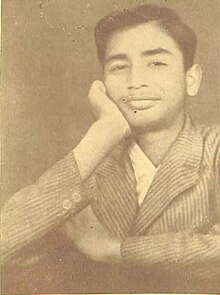Sukanta Bhattacharya
Sukanta Bhattacharya সুকান্ত ভট্টাচার্য | |
|---|---|
 Sukanta Bhattacharya | |
| Occupation | Poet, writer |
| Language | Bengali |
| Nationality | Indian |
| Genre | Poet, short-story writer, playwright |
| Subject | Literature |
| Literary movement | Bengal Renaissance |
| Notable works | Chharpatra Purbabhash Ghum Nei |
Sukanta Bhattacharya (Template:Lang-bn Shukanto Bhôṭṭacharjo) (August 15, 1926 – May 13, 1947) was a Bengali poet and playwright. Along with Rabindranath Tagore and Kazi Nazrul Islam, he was one of the key figures of modern Bengali poetry, despite the fact that most of his works had been in publication posthumously. During his life, his poems were not widely circulated, but after his death his reputation grew to the extent that he became one of the most popular Bengali poet of the 20th century. He has had a significant influence on poet Subhas Mukhopadhyay and composer Salil Chowdhury who set some of his popular poems to music.
The poetry of Sukanta Bhattacharya is characterized by rebel socialist thoughts, patriotism, humanism and yet romanticism.
Life
Sukanta Bhattacharya was born on 15 August 1926 to Nibaran Chandra Bhattacharya, owner of Saraswat Library, a publishing and book selling enterprise, and Suniti Devi. He was the second of their six sons, Sushil, Prashanta, Bibhash, Ashoke and Amiya. Buddhadeb Bhattacharya, the former Chief Minister of West Bengal is his nephew. Sukanta was born at his maternal grandfather’s house at Kalighat, Calcutta (now Kolkata, West Bengal), although his family hailed from Kotalipara village in Gopalganj of modern day Bangladesh.
Sukanta spent his childhood at their house at Nibedita Lane, Bagbazar. He was sent to Kamala Vidyamandir, a local primary school where his literary career began. His first short story was published in Sanchay, the school’s student magazine. Later another of his prose writing, "Vivekanander Jibani", was published in Sikha, edited by Bijon Bhattacharya.[1]
He joined the Communist Party of India in 1944. In the same year, he edited an anthology, named Akal (Famine) published by the Anti-Fascist Writers' and Artists' Association. In 1945, he appeared in the entrance examination from Beleghata Deshbandhu High School but failed. He was the editor of the Kishore Sabha (youth section) of the Bengali daily organ of the party, Dainik Swadhinata from its inception in 1946. He died of tuberculosis at the Jadavpur T. B. Hospital (later, K. S. Roy T. B. Hospital) in Calcutta at a very young age of 20. A comprehensive account of the poet's life can be found in Kabi Sukanta Bhattacharya O Sei Samay written by the poet's youngest brother, Amiya Bhattacharyya.
Works
Prodigious Sukanta's poetry was published in magazines while he was alive, and except for Chharpatra his books were all published posthumously:
- Chharpatra (ছাড়পত্র) (Certificate, 1947)
- Ghum Nei (ঘুম নেই) (Sleepless, 1954)
- Purbabhas (পূর্বাভাস) (Premonition, 1950)
- Abhijan (অভিযান) (Expedition, 1953, a play)
- Mithe-Kadha (মিঠে-কড়া) (Sweet and sour 1951)
- Giti Guccha(গীতিগুচ্ছ) (Songs1965)
His works are deeply marked and influenced by his communist experience. One of his shorter poems from Chharpatra compares the moon with a burnt roti, a prosaicness born of hunger:
|
ক্ষুধার রাজ্যে পৃথিবী গদ্যময় পূর্ণিমার চাঁদ যেন ঝলসানো রুটি |
"Poetry, we do not need you anymore. A world devastated by hunger is too prosaic, The full moon now reminds us of toasted bread" |
- Sukanta Samagra (সুকান্ত সমগ্র) (Complete Works of Sukanta) (1967), published by the Saraswat Library, Kolkata was edited by Subhash Mukhopadhyay. This includes all the printed texts, some lesser known writings, his plays and stories, which include Khudha (Hunger), Durboddho (Incomprehensible), Bhadralok (Gentleman) and Daradi Kishorer Svapna (Dream of a Compassionate Adolescent), an article, Chhanda O Abritti and also a selection of lettrs.
- Patra Guchha (Letters)
Quotation
- I did love Kolkata as a mysterious woman, the beloved, my mother...I don't the outside world, my world is Kolkata... I do want to live, but I'm certain that the death of Kolkata will bring my end."
- There is Bengal, and Bihar, Barakor river is in the middle of them; so strange, so profound! No other river (not even Ganga) has cast so vast a spell on me."
- Radio, books, sports -- so many means to spend time, but what I like most is the leafy sunshine amidst the Debdaru."
Notes
- ^ Chatterjee, Dr Partha (2008). Bangla Sahitya Parichay (in Bengali). Kolkata: Tulsi Prakashani. pp. 429–31. ISBN 81-89118-04-8.
{{cite book}}: Unknown parameter|trans_title=ignored (|trans-title=suggested) (help)
References
- Golpo Songroho (Collected Stories), the national textbook of B.A. (pass and subsidiary) course of Bangladesh, published by University of Dhaka in 1979 (reprint in 1986).
- Bangla Sahitya (Bengali Literature), the national textbook of intermediate (college) level of Bangladesh published in 1996 by all educational boards.
- Sukanta Samagraha(Bengali Literrature),Juthika Book Stall.
External links
- Banglapedia: Bhattacharya, Sukanta
- Works of Sukanta Bhattacharya
- Shukanto Bhattacarya - known as a young Bengali poet of hunger and revolution By Upali sramon
